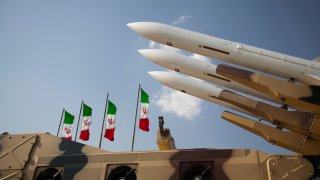Is Iran’s Strategic Patience At An End?
While this round of conflict appears to be over, more escalatory situations are likely to occur, and the likelihood of an extensive war between Iran and Israel has indeed risen.
The reported precise yet limited Israeli attack against an Iranian missile defense facility near Isfahan last week delivered a nuanced threat without pushing escalation forward. Based on operational superiority, it signaled a potential future destructive assault on Iranian strategic targets, should such a decision be made.
Iran’s downplaying of the attack likely ends the most significant escalation observed between the two countries. The most noteworthy aspect of the recent escalation was an unprecedented large-scale Iranian military assault on Israeli territory. But, while many focus on the immediate context of the Israeli attack in Damascus, the bigger picture is commonly overlooked.
Yes, Iran meant to set a new equation by responding disproportionately to Israel’s attack in Syria. However, it does not stand alone. This maneuver aligns with a broader pattern of daring and escalation with other adversaries, including Pakistan. This new approach, aimed at preventing regime destabilization, is based on increased confidence in risk management and a narrower, more conservative political system.
While this round of conflict appears to be over, more escalatory situations are likely to occur, and the likelihood of an extensive war between Iran and Israel has indeed risen. Now is the time to recalibrate the escalation course with more calculated conduct based on both sides’ corrected understanding of perceptions, game rules, and red lines.
The immediate reason for the change in Iranian policy can be attributed to the recent Israeli operation in Damascus, which Iran perceived as a humiliating military attack on its sovereign territory, necessitating a significant response.
Yet, the nature of the Iranian attack also originates from long-term strategic thinking. One of the reasons relates to Israel, which has intensified its campaign against Iran in recent years in both scale and frequency. It has targeted official personnel and expanded its focus from the nuclear and missile arena to more “civilian” sectors, including a recent unusual covert attack on the Iranian energy sector.
Senior regime officials likely concluded that their previous responses did not provide sufficient deterrence against Israel, which continued to perceive Iran as a cautious entity. This, in turn, led Israel to intensify its hostilities.
However, the Iranian response is part of a broader policy shift that extends beyond the Israeli context. It aligns with another unprecedented military strike carried out on January 16, 2024, on Pakistani territory. For Tehran, the accumulation of attacks against Iranian forces, both inside and outside the country, poses a risk to regime stability. It represents a dangerous exploitation of opportunities by its adversaries against the backdrop of the ongoing conflict in the Middle East.
The attacks in Israel and Pakistan indicate a growing Iranian willingness to take risks against formidable adversaries, contrary to its usual preference to operate in the shadows or behind partners and proxies.
This shift appears to stem from a newfound confidence bolstered by a series of recent strategic successes. These include strengthening the strategic partnership with Russia, improving regional diplomatic ties, achieving new heights in nuclear weapons development, circumventing oil sanctions, and coordinating actions of the “Axis of Resistance” after October 7. Iran also benefits from the escalating political, social, and security crisis in Israel. Additionally, the perceived reluctance of the United States to directly confront Iran and its focus on other arenas may further enhance Iran's confidence.
Furthermore, as reflected in last month’s legislative election results, the conservative trend contributes to confrontational behavior. While some moderate elements continue to advocate for a cautious foreign policy and support “strategic patience,” hawkish voices seem more dominant in decision-making processes. This and the aging supreme leader’s concerns about his legacy may encourage bolder decisions, diverting from his typically cautious approach.
Self-confidence and hawkish leadership might have amplified an assessment that Israel would avoid further significant escalation and contain the attack, either to prevent multiple fronts of war or due to American pressure.
Iran's increased risk-taking is alarming. Beyond the current military escalation, this behavior raises concerns about potential confrontational steps in other arenas, including its nuclear program.
The last exchange of blows might be a prelude to a direct war between Israel and Iran, destructive for the entire region. In an attempt to avoid it and after both sides showed resolve, now is the time to recalibrate the escalation course. It’s still possible to transform the volatile situation into a formative experience while better apprehending the opponent and the strategic environment.
Israel should consider Iran's policy shift, which makes it more risk-prone. This doesn’t mean avoiding confrontation categorically but rather requires acting in a calculated and subtle manner. While the operation in Damascus stemmed from a miscalculation of Iran’s response, the attack in Isfahan demonstrated a more sophisticated approach.
As for Iran, if it wishes to avoid war, it must recognize the thin line between self-confidence and over-confidence. Any miscalculation here brings a regional conflagration closer.
Assaf Zoran is a research fellow at the Belfer Center's MTA project. He has dedicated the past twenty-five years to research, policy shaping, operational planning, and strategic dialogue with decision-makers in the government of Israel and abroad.
Image: Shutterstock.com.

